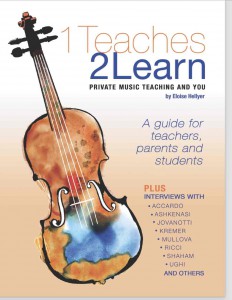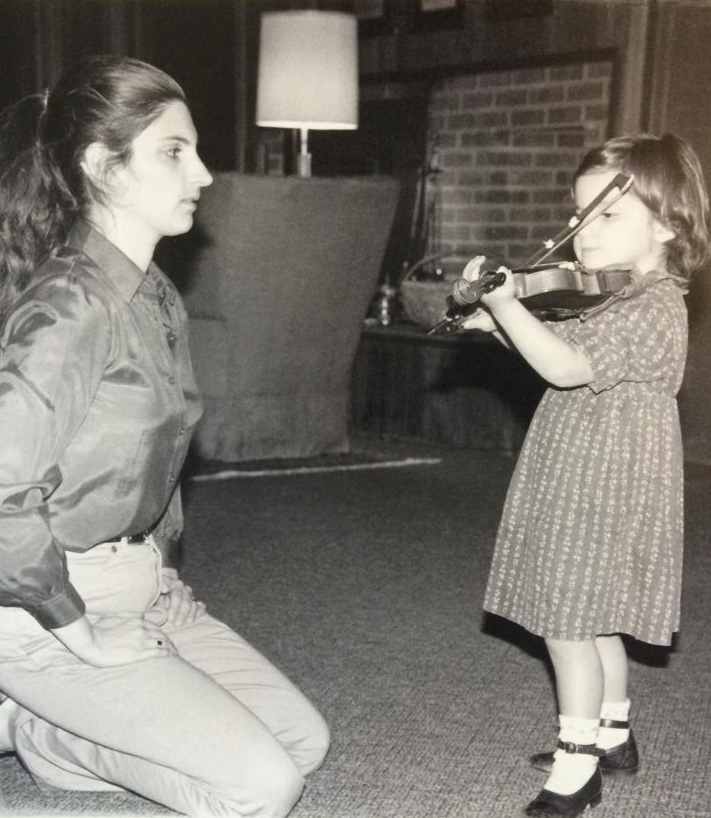Faith – or Yet Another Reason Why Playing the Violin is Important
Recital time has arrived which always makes me reflect on the difficulties of preparing a student to play in public. There are various phases of mastering and preparing a piece for performance:
- Learning the notes.
- Deciding on the fingerings.
- Solving the technical problems.
- Learning the bowings.
- Learning the dynamics.
- Deciding what the phrases are.
- Paying attention to thousands of little tiny details not included in this list.
- Deciding on the interpretation.
- Putting it all to memory.
That’s it, right? Nope. There is one final ingredient students have to add:
10. Faith.
That’s right faith. I don’t mean this in a religious sense (although that doesn’t hurt), but faith in themselves and, more importantly, faith in their hands. They have to trust their hands that they have prepared so well. I often tell my students that the body is a donkey – if you prepare it well with good habits, then the donkey will always do the same thing the same way. But you have to trust the donkey – that it will go through the motions and take you where you want to go. So if you have prepared your body and your mind well, then relax and enjoy yourself and let your spirit and the music speak!
The problem is that when students start to have stage fright, thinking that they aren’t capable of performing their recital piece well, they are forgetting that their hands know an awful lot and that the body has a really good memory. We think “ourselves” is only what’s in our mind and emotions. The study of the violin should teach us all that we are composed of three elements that must all work together to make beautiful music: the mind (to learn and to practice) , the soul (for expression) and the body (to actually play the darned thing).
The idea is to take the student’s focus away from “himself,” i.e., what he thinks is himself – that capricious monkey we all have in our heads which can play tricks on us – and put it on something he really can trust: his body memory. If the student has done the same thing the same way 1000 times, then it is probable he will do it the 1001st time the same way as long as he keeps his mind on the music – hearing what he wants to do in his head. Why does he have to keep his mind on the music if his body will do the job for him? Because if a student does not keep his mental attention firmly on the task at hand, a wandering or hyper-critical mind can disrupt the whole process by talking louder than a student’s body memory. It’s synergy – mind, body and soul must work together to make something greater than the sum of its parts.
So faith and trust. Two little words we teachers don’t use enough. Yes, it is part of our job to teach students how to have faith in themselves. And how do you get your student to the point of being able to have faith in his whole self and trust in his preparation besides teaching him to practice? Explanation, explanation and more explanation. What do we explain apart from the obvious technical stuff? That we human beings are complicated and we tend to divide ourselves up (mind, body, soul). One of the few moments that a person is a wholly integrated human being, that is, using all his elements at the same time to the highest level, is when he or she is playing music – especially an instrument as complicated and difficult as the violin.
I often ask my students why they like to play the violin (I differentiate practicing from playing in this question for reasons you can well imagine). They often say don’t know, meaning they can’t put it into words. So then I give them my explanation (having had a lifetime to think about it) about being a whole human being in the moment they are playing. They love it. It makes them feel important, makes them aware that what they are doing is important and that playing the violin must be taken seriously even if they can only practice very little. I also emphasize that music is not only good for the person playing (mental, physical, and spiritual development) but for whoever listens to it, too, which is why we have to be careful how we play and even how we practice. Who knows where those sound waves wind up?
Convincing a student that playing music is important helps give him purpose and focus which lead to self-trust – young people are rarely made to feel that anything they do is of great importance for others. Adults and teachers always talk about potential and preparation for a career, for example, but not that what the student is doing in this very minute is important for humanity. Young people are taught to live in the future, not the present – what will be, not what is – so is it any wonder that they may have trouble having faith in themselves when their future selves don’t exist yet? They must be encouraged to see that what they are doing NOW is important for NOW, although certainly what they do now also has consequences for the future. Our job is to help students see themselves as complete human beings as they already are, not only as potential future musicians. They need to be told that they can trust themselves, their completeness and their preparation in this very moment and in any moment they get up to play for others.
I remind my students often that they are playing not for themselves but for the universe and we owe it to our listeners, wherever they may be, to give it our best shot with everything we have. Faith in our whole selves is part of the package.
Or, as I wrote on a solo part of one anxious, overthinking but well prepared young musician just before her public performance: “JUST PLAY IT!” And she did.
Post Author: Eloise Hellyer
Share this:
Buy it on www.sharmusic.com - eBook format, avaliable worldwide, paperback in North America
COPYRIGHT
ABOUT
A music teacher’s thoughts and observations on the teaching and the study of a musical instrument, hoping to be of help to parents, students and teachers.
PHOTO
AWARDED TOP 25 VIOLIN BLOG
CATEGORIES
TAGS
ARCHIVES
-
Agosto 2022
Agosto 2023
Agosto 2024
April 2015
April 2016
April 2017
April 2019
April 2020
Aprile 2022
Aprile 2023
Aprile 2024
August 2014
August 2015
August 2016
August 2017
August 2018
August 2019
August 2021
December 2014
December 2015
December 2016
December 2017
December 2018
December 2019
December 2020
Dicembre 2022
Dicembre 2023
Dicembre 2024
Febbraio 2022
Febbraio 2023
Febbraio 2024
February 2015
February 2016
February 2018
February 2019
February 2020
February 2021
Gennaio 2022
Gennaio 2023
Gennaio 2024
Giugno 2022
Giugno 2022
Giugno 2023
Giugno 2024
January 2015
January 2016
January 2017
January 2018
January 2019
January 2020
July 2015
July 2017
July 2019
June 2016
June 2017
June 2018
June 2019
June 2020
June 2021
Luglio 2022
Luglio 2023
Luglio 2024
Maggio 2022
Maggio 2023
Maggio 2024
March 2015
March 2016
March 2017
March 2018
March 2019
March 2020
March 2021
Marzo 2022
Marzo 2023
Marzo 2024
May 2015
May 2016
May 2018
May 2019
May 2020
November 2014
November 2015
November 2016
November 2017
November 2018
November 2019
November 2021
Novembre 2022
Novembre 2023
Novembre 2024
October 2014
October 2015
October 2017
October 2018
October 2019
October 2020
October 2021
Ottobre 2022
Ottobre 2023
Ottobre 2024
September 2014
September 2015
September 2016
September 2018
September 2019
September 2020
September 2021
Settembre 2022
Settembre 2023
Settembre 2024
RECENT POSTS
Terry G and Me, or Terry Gilliam on Where (or What) Practicing the Piano Will Get You…
The Teaching We Don’t Do Is More Important Than We Think
Overwhelmingness or What Teaching and Motherhood* Have in Common
Cellphone Serenity
How to Build Your Reputation – the Kind You Want
Desperate Times, Desperate Measures. Or How to Deal With Your Strong-Willed Stubborn Student and Survive
“Why Does My Teacher Get So Frustrated?” Letter to a Perplexed Student
Mount Rush-no-more….And How to Get There
Realizzato con VelociBuilder - Another Project By: Marketing:Start! - Privacy Policy




